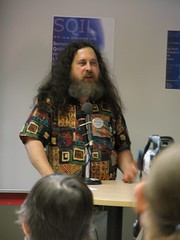Somewhere I’ve read that waiting for the interesting post too gestate into something truly gem-like usually means you won’t post about it. So, I was “planning to write a longer post later” (ha! I’ve heard that before); instead I’ll just jot down some thoughts about the copyright2005 conference I attended last night in Montreal, where Richard Stallman gave the keynote, followed by a pannel discussion with rms, russell mcormond of digital copyright canada, and Marcus Bornfreund of Creative Commons Canada, and a few others.
RMS’s speech was done in (somewhat faltering) french, and covered tghe general issues of free software and patent/artistic issues. The Q&A and pannel discussions were much more interesting, mainly for the rather viscious debate between rms and marcus bornfreund of Creative Commons Canada.
rms has withdrawn explicit support for the Creative Commons project (though he recognizes it is a “better” option than the mainstream) because CC has added several new licence options (to the original six), at least one of which, in rms’s view, do not do an adequate job of protecting freedom. (Here is the full list of CC licenses). rms argues that, like the GPL, the creative commons licences should insist on a certain number of core freedoms. Apparently in conversations with CC founder Larry Lessig, Lessig said that those freedoms were “empty” in the CC format.
This criticism of Creative Commons set off the litigator instinct in lawyer-Marcus Bornfreund, who attacked Stallman’s position (and Stallman himself) as a “fascist leader,” forcing his “ideology” on his “followers,” and denying people “choice,” after all doesn’t “choice mean freedom? Yet your leader wants to deny you choice.” It was a pretty intense attack, and a little awkward, but raises a very good question that people need to be able to answer. Is choice freedom?
Bornfreund’s view, as I understood it, is that the author (of art, of software) should be able to choose between a full spectrum of licences, presumably from the freest to the most restricting (if his claim that choice means freedom is valid, then in this case the choice should go all the way to the most restrictive patent/copyright now available). Bornfreund is arguing to give the author the ability to allow users of his/her work to share, if the author wishes. Freedom to share is something the author has the right to grant, or not.
Stallman claims that certain freedoms must be essential for everyone, such as the right to make unlimited non-commercial copies of works. Stallman is arguing that the right to share should be an essential freedom for people regardless of what the author thinks. (Note this is in non-commercial cases). Freedom to share is an inalienable right for all of society.
In other words, Stallman argues for freedom in society, whereas Bornfreund argues for freedom of the author.
It’s too bad the debate was so acrimonious, with, I think it’s fair to say, Bornfreund crossing the line from reasoned argument to show-boaty attack, and not coming off too well in the process. His fascist comments were over the top, and his views of freedom rather childish (if you think freedom is so great, then I am free to punch you in the nose and there’s nothing you can do about it), still if you don’t have time to think about it they sell well, especially since you hear this kind of view of freedom so often (eg free markets = democracy etc).
I guess Stallman has seen this kind of attack before, in the Open Source split from the Free Software movement, where his insistence that there is a philosophical reason for making source code available was made a secondary concern to the pragmatic advantages to open source coding methods. That is, the ethical principle of Free Software was replaced with pragmatic principle in open source. An improved means of production is not the goal of the free Software movement, though it’s a nice fringe benefit.
To be a principled person in the face of competing practical concerns is not easy, and Stallman just seems to shrug off accusations of utopian dreaming and evangelism. He has a belief about what is right, a goal for what right would look like, and refuses to bend from these pillars. He’ll continue taking lumps for that cause, I’m sure.
indymeda.quebec recorded (audio & visual) the event and it should be available here, soon.
and congrats to Robin Millette and the rest of the organizers and volunteers for putting together such a successful event.
